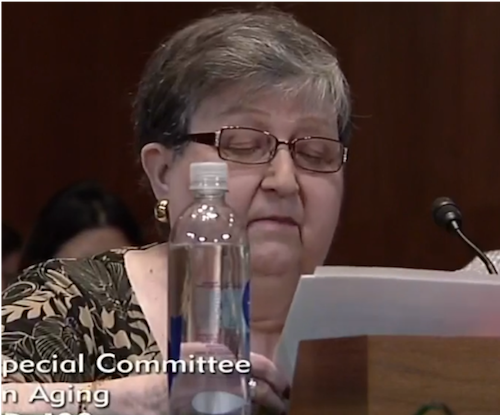Patients Tell Congress, Paying For Life-Saving Medications Often Means Going Without Basic Needs & Going Into Debt
Five patients testified before the U.S. Senate Special Committee on Aging Wednesday to tell their harrowing stories of how skyrocketing drug prices have impacted their lives and their finances. This is the first of three hearings this week addressing the crisis of prescription drug prices, building on the momentum of three hearings held earlier this year – a strong signal that Congress is moving toward concrete action on out-of-control drug prices.
Here are their stories:
Michelle Dehetre describes how paying for her insulin puts a financial strain on her budget every month.
“I require two types of insulin to live … I work fulltime and shell out nearly $300 per month out of pocket on insulin, syringes and test strips that keep me alive.”
“The money that I am spending on diabetes treatment is already too much. In addition to buying food, paying the electric bill and other monthly bills for my household, spending $300 per month for my diabetes medication is a major financial strain. I cut back on spending whenever I can. I am always looking for ways to save money on food and gas, and sometimes fall short at the end of the month. Treating my diabetes is a matter of life and death. Sadly, I know that I am actually better off than others. In the year 2019, I wonder how many others are struggling to cover the cost of insulin and other diabetes treatments … In 2019, no one should have to go through this.”
Pamela Holt encourages Congress to pass the CREATES Act so she can access a generic version of Revlimid, a life-saving cancer drug she relies on to keep her multiple myeloma at bay.
“I’m encouraged by the actions Congress is starting to make in the hearing in the last couple of months. I’m particularly grateful to this committee for listening to patients. What patients need most is a real change to the system and congressional action to bring down drug prices. For me one solution would be the CREATES Act It addresses a tactic the company that makes Revlimid, Celgene, uses to deny generic companies access to samples of Revlimid. There are no competing drugs for the drug I need to take so they can charge whatever they want. I understand this year it’s up to $740, rather than the $600 I was paying. Celgene can set whatever prices they want. I was disappointed that [the CREATES Act] didn’t get completed but I’m excited it’s back on the table.”
Sheldon Armus says the pharmaceutical industry encourages maintaining and increasing high list prices – and he knows from experience. He used to work for the industry.

“[I]t’s in the best interest of the pharmaceutical companies to artificially inflate the list price. I know because I worked in the industry. I attended meetings in which maintaining and increasing the high list prices was discussed and encouraged.”
“At one time I was proud to have worked in the pharmaceutical industry, but now, being a patient, I no longer feel that way. In fact, I’m embarrassed to tell my fellow seniors of my past work experience … The issue starts at the top with high list prices, but it ends at the bottom with us, patients just trying to continue to live their lives.”
Barbara Cisek pays $500 a month for her medications, but if she took all of the medications her doctor prescribed, it would cost her more than $1,500 a month.

“I wonder what will happen if I get to be the same age as my mother with all the medical expenses I am facing on a fixed income, I’m scared there won’t be anything left. I pay about $500 out of my own pocket for medicine every month. If I actually take all my medications my doctor prescribes the cost will total over $1,500 per month.”
“That’s why I’m sharing this with you today, to help to understand what it’s like for those of us senior citizens who are feeling the full weight of the costs because we make a little too much. My husband retired as an engineer for Westinghouse for 33 years. He worked hard, as did I, to build a good life and a good future for our family. I’ve lived in our home for 45 years and don’t want to leave it. I want to be able to afford my medicine so I can stay healthy and away from a nursing home. I came here today to speak not only for myself but for every senior citizen who has had to stand in the pharmacy counter and leave something behind.”
###